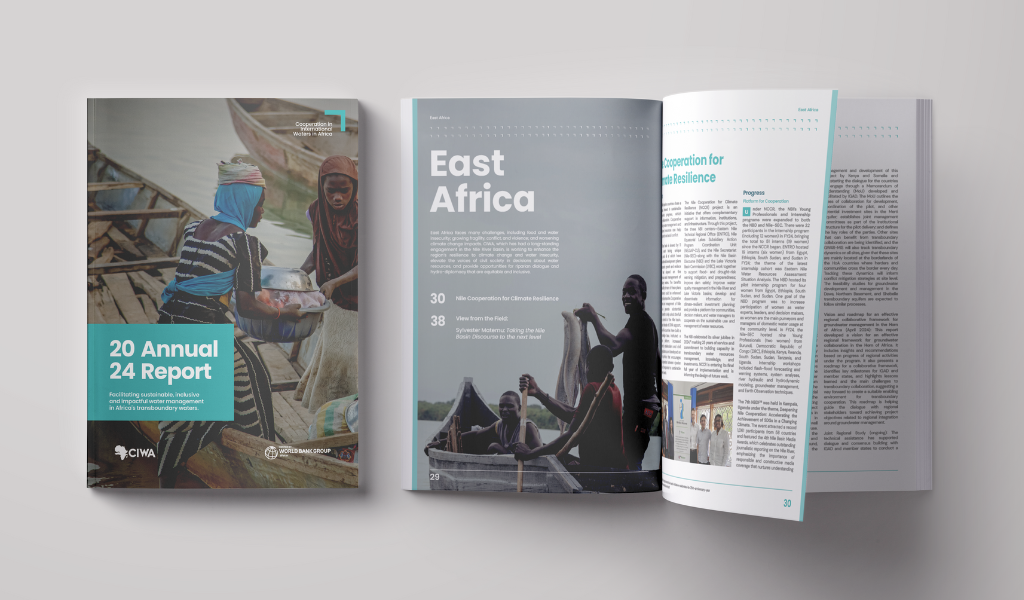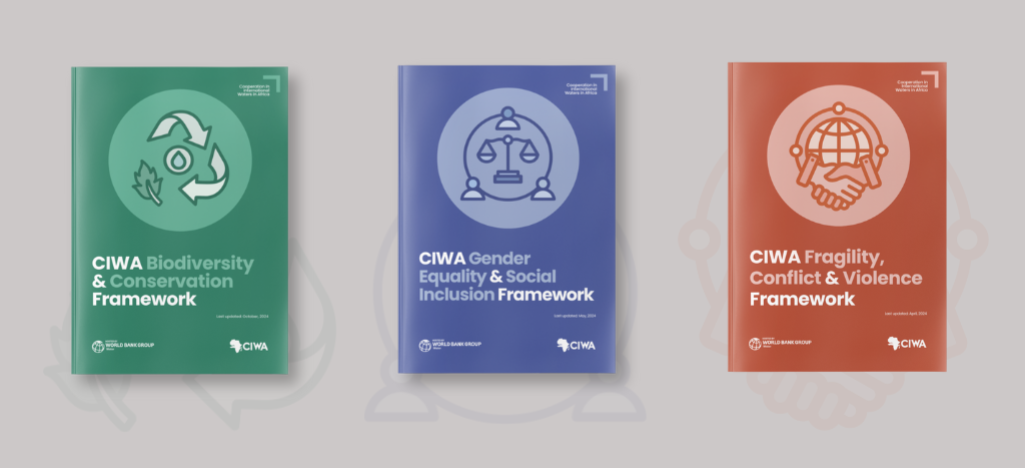Going Beyond Water: CIWA Program Unveils 2024 Annual Report
Posted in : Blog on 13 December 2024

This year, the Annual Report 2024 is available in flipbook version.
The Cooperation in International Waters in Africa (CIWA) Partnership worked diligently and successfully in the 2023-2024 fiscal year to address mounting challenges including climate change, conflict, and instability across Sub-Saharan Africa.
There was a civil war in Sudan. A coup in Niger. Conflicts in the Horn of Africa, which also faced floods after several years of historic droughts and locust surges, heightening food insecurity. There is so much water in Lake Victoria, where water levels have hit a 128-year high, that the region is bracing for flooding into the Nile River as it flows through South Sudan. As many as 3 million South Sudanese could need humanitarian assistance if governments do not cooperate to provide early warning and agreements about dam releases in upstream countries.
CIWA’s work to promote transboundary water cooperation in Nile River Basin countries has laid the groundwork for collaboration to minimize catastrophic flood impacts. Its work in the Nile, the Horn of Africa, West and Central Africa, and Southern Africa is detailed in a new publication, 2024 Annual Report: Facilitating sustainable, inclusive, and impactful water management in Africa’s transboundary waters.
Water, most of which is transboundary in Sub-Saharan Africa, is not only a resource but also the lifeblood of communities, ecosystems, and economies. We simply cannot alleviate poverty and achieve shared prosperity without ensuring water, ecosystem and food security.
New initiatives launched
The Annual Report showcases how CIWA is building on one of the recommendations of its Multi-Sector Investment Opportunity Analysis (MSIOA) for the Cubango-Okavango River Basin by launching the Resilient Livelihoods Enhancement Program to address underlying drivers of poverty, which will inform longer-term initiatives. The program will propose resilient livelihoods investments with a pro-poor focus aimed at increasing benefits to communities while restoring and maintaining the biodiversity integrity of the basin.
CIWA also launched the Lake Kariba Transboundary Fisheries technical assistance. Lake Kariba, in the Zambezi River Basin, has suffered a dramatic decline in water levels from droughts, harming people who depend on the lake for food and livelihoods. The lake accounts for 35 % and 90 % of fish production, respectively, in Zambia and Zimbabwe. The drop in water levels has led habitats and breeding grounds for many aquatic species to shrink, resulting in very low catches for fisher people. Moreover, differences in fisheries policy and practice between the two countries affect the number of fish in the lake and are a source of tension.
CIWA’s new technical assistance is taking an evidence-based, participatory approach to assess the socioeconomic impacts of the declining fisheries stock and the impact of climate change on communities and promoting stakeholder participation in transboundary conservation and fisheries management.
To support the World Bank’s Regional Climate Resilience Program for Eastern and Southern Africa Series of Projects, which aims to increase resilience to water-related climate shocks, CIWA launched Strengthening Transboundary River Basin Organizations through Program Development and Capacity Building in Africa and the South Sudan Transboundary Waters Support Program. The latter will include support to deepen the dialogue on climate risk and water resources management in refugee hosting areas and define interventions to maximize resilience. This engagement will also identify and analyze the agencies currently engaged in water-related initiatives in areas of forced displacement, help fill existing gaps, and leverage synergies, ensuring that the water needs of refugees and host communities are met effectively and efficiently.
The South Sudan program will improve livelihoods with an emphasis on the role of biodiversity and ecosystem services in contributing to resilience. This activity will create a freshwater biodiversity baseline and evaluate anthropogenic pressures on ecosystems in the Sudd wetland.
Setting CIWA up for continued success
CIWA took several key steps to build on its achievements in the years ahead.
It worked closely with development partners, clients, World Bank experts, and other partners to develop a robust pipeline, a revised and updated Theory of Change, and a new Results Framework called Pathways to Impact, all of which reflect the increasing pressure on transboundary waters, greater strategic orientation, and enhanced approaches to working on the cross-cutting themes of biodiversity; climate resilience; gender and social inclusion; and fragility, conflict, and violence as pathways to delivering results on the three Is (Investments, Information, and Institutions).
Pathways to Impact calls for a more diversified investment portfolio that includes groundwater resources management, nature-based solutions, biodiversity, and livelihoods; scaling up through World Bank International Development Association (IDA) regional integration programs; and enhancing a bottom-up approach by expanding work to elevate the role of communities in water resources management and security, conflict prevention, and peace building. This builds on, and is underpinned by, the regional public good nature of transboundary water management.
CIWA also positioned itself for enhanced strategic work by developing (in English and French) a Fragility, Conflict and Violence (FCV) Framework, updating its Gender Equality and Social Inclusion (GESI) Framework, conducting a biodiversity assessment, and developing a Biodiversity and Conservation Framework. It also conducted a climate change assessment of all its initiatives, which found that six major hydropower investments influenced by CIWA have the potential to mitigate 26.4 million tons of CO₂ equivalent (tCO2eq) of GHG emissions each year.

Thanks to CIWA’s track record of success, continued client demand, and strong donor interest, the World Bank management endorsed CIWA receiving a five-year extension, from 2026 to 2031. This will enable it to complete ongoing activities and have more time to fundraise for the new pipeline.
CIWA is well-positioned to match the higher ambitions developed this year by the World Bank and its new mission of achieving a world free of poverty on a livable planet. This includes aligning its program with the World Bank’s Global Challenge Programs, the first of which focuses on strengthening water security, increasing access to safe water supply and sanitation, and scaling up sustainable water management solutions.
Looking ahead
In the coming year, CIWA plans to launch a project with the Nile Basin Discourse to engage communities in water and climate data generation to enhance resilience, water resources management, disaster preparedness, and cooperation. It also plans to begin an initiative in future years to support the World Bank’s Development, Resilience, and Valorization of Transboundary Water for West Africa (DREVE) program with knowledge generation and other activities through assistance to the Niger Basin Authority.
In the years ahead, CIWA will continue to help turn potential sources of conflict into reservoirs of sustainable growth and development.


